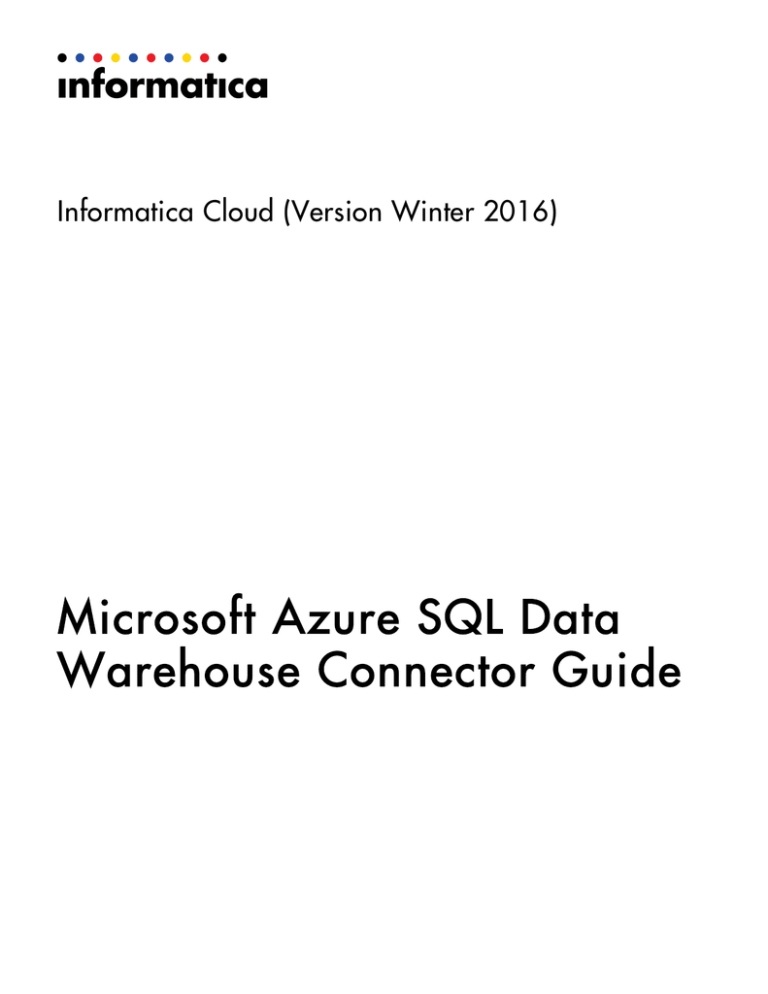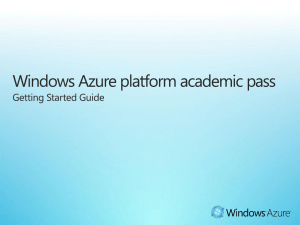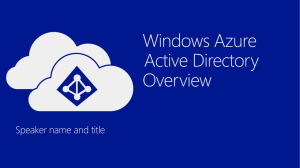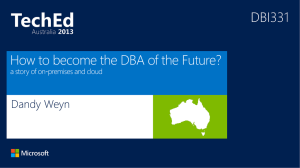
Informatica Cloud (Version Winter 2016)
Microsoft Azure SQL Data
Warehouse Connector Guide
Informatica Cloud Microsoft Azure SQL Data Warehouse Connector Guide
Version Winter 2016
February 2016
Copyright (c) 1993-2016 Informatica LLC. All rights reserved.
This software and documentation contain proprietary information of Informatica LLC and are provided under a license agreement containing restrictions on use and
disclosure and are also protected by copyright law. Reverse engineering of the software is prohibited. No part of this document may be reproduced or transmitted in any
form, by any means (electronic, photocopying, recording or otherwise) without prior consent of Informatica LLC. This Software may be protected by U.S. and/or
international Patents and other Patents Pending.
Use, duplication, or disclosure of the Software by the U.S. Government is subject to the restrictions set forth in the applicable software license agreement and as
provided in DFARS 227.7202-1(a) and 227.7702-3(a) (1995), DFARS 252.227-7013©(1)(ii) (OCT 1988), FAR 12.212(a) (1995), FAR 52.227-19, or FAR 52.227-14
(ALT III), as applicable.
The information in this product or documentation is subject to change without notice. If you find any problems in this product or documentation, please report them to us
in writing.
Informatica, Informatica Platform, Informatica Data Services, PowerCenter, PowerCenterRT, PowerCenter Connect, PowerCenter Data Analyzer, PowerExchange,
PowerMart, Metadata Manager, Informatica Data Quality, Informatica Data Explorer, Informatica B2B Data Transformation, Informatica B2B Data Exchange Informatica
On Demand, Informatica Identity Resolution, Informatica Application Information Lifecycle Management, Informatica Complex Event Processing, Ultra Messaging and
Informatica Master Data Management are trademarks or registered trademarks of Informatica LLC in the United States and in jurisdictions throughout the world. All
other company and product names may be trade names or trademarks of their respective owners.
Portions of this software and/or documentation are subject to copyright held by third parties, including without limitation: Copyright DataDirect Technologies. All rights
reserved. Copyright © Sun Microsystems. All rights reserved. Copyright © RSA Security Inc. All Rights Reserved. Copyright © Ordinal Technology Corp. All rights
reserved. Copyright © Aandacht c.v. All rights reserved. Copyright Genivia, Inc. All rights reserved. Copyright Isomorphic Software. All rights reserved. Copyright © Meta
Integration Technology, Inc. All rights reserved. Copyright © Intalio. All rights reserved. Copyright © Oracle. All rights reserved. Copyright © Adobe Systems
Incorporated. All rights reserved. Copyright © DataArt, Inc. All rights reserved. Copyright © ComponentSource. All rights reserved. Copyright © Microsoft Corporation. All
rights reserved. Copyright © Rogue Wave Software, Inc. All rights reserved. Copyright © Teradata Corporation. All rights reserved. Copyright © Yahoo! Inc. All rights
reserved. Copyright © Glyph & Cog, LLC. All rights reserved. Copyright © Thinkmap, Inc. All rights reserved. Copyright © Clearpace Software Limited. All rights
reserved. Copyright © Information Builders, Inc. All rights reserved. Copyright © OSS Nokalva, Inc. All rights reserved. Copyright Edifecs, Inc. All rights reserved.
Copyright Cleo Communications, Inc. All rights reserved. Copyright © International Organization for Standardization 1986. All rights reserved. Copyright © ejtechnologies GmbH. All rights reserved. Copyright © Jaspersoft Corporation. All rights reserved. Copyright © International Business Machines Corporation. All rights
reserved. Copyright © yWorks GmbH. All rights reserved. Copyright © Lucent Technologies. All rights reserved. Copyright (c) University of Toronto. All rights reserved.
Copyright © Daniel Veillard. All rights reserved. Copyright © Unicode, Inc. Copyright IBM Corp. All rights reserved. Copyright © MicroQuill Software Publishing, Inc. All
rights reserved. Copyright © PassMark Software Pty Ltd. All rights reserved. Copyright © LogiXML, Inc. All rights reserved. Copyright © 2003-2010 Lorenzi Davide, All
rights reserved. Copyright © Red Hat, Inc. All rights reserved. Copyright © The Board of Trustees of the Leland Stanford Junior University. All rights reserved. Copyright
© EMC Corporation. All rights reserved. Copyright © Flexera Software. All rights reserved. Copyright © Jinfonet Software. All rights reserved. Copyright © Apple Inc. All
rights reserved. Copyright © Telerik Inc. All rights reserved. Copyright © BEA Systems. All rights reserved. Copyright © PDFlib GmbH. All rights reserved. Copyright ©
Orientation in Objects GmbH. All rights reserved. Copyright © Tanuki Software, Ltd. All rights reserved. Copyright © Ricebridge. All rights reserved. Copyright © Sencha,
Inc. All rights reserved. Copyright © Scalable Systems, Inc. All rights reserved. Copyright © jQWidgets. All rights reserved. Copyright © Tableau Software, Inc. All rights
reserved. Copyright© MaxMind, Inc. All Rights Reserved. Copyright © TMate Software s.r.o. All rights reserved. Copyright © MapR Technologies Inc. All rights reserved.
Copyright © Amazon Corporate LLC. All rights reserved. Copyright © Highsoft. All rights reserved. Copyright © Python Software Foundation. All rights reserved.
Copyright © BeOpen.com. All rights reserved. Copyright © CNRI. All rights reserved.
This product includes software developed by the Apache Software Foundation (http://www.apache.org/), and/or other software which is licensed under various versions
of the Apache License (the "License"). You may obtain a copy of these Licenses at http://www.apache.org/licenses/. Unless required by applicable law or agreed to in
writing, software distributed under these Licenses is distributed on an "AS IS" BASIS, WITHOUT WARRANTIES OR CONDITIONS OF ANY KIND, either express or
implied. See the Licenses for the specific language governing permissions and limitations under the Licenses.
This product includes software which was developed by Mozilla (http://www.mozilla.org/), software copyright The JBoss Group, LLC, all rights reserved; software
copyright © 1999-2006 by Bruno Lowagie and Paulo Soares and other software which is licensed under various versions of the GNU Lesser General Public License
Agreement, which may be found at http:// www.gnu.org/licenses/lgpl.html. The materials are provided free of charge by Informatica, "as-is", without warranty of any
kind, either express or implied, including but not limited to the implied warranties of merchantability and fitness for a particular purpose.
The product includes ACE(TM) and TAO(TM) software copyrighted by Douglas C. Schmidt and his research group at Washington University, University of California,
Irvine, and Vanderbilt University, Copyright (©) 1993-2006, all rights reserved.
This product includes software developed by the OpenSSL Project for use in the OpenSSL Toolkit (copyright The OpenSSL Project. All Rights Reserved) and
redistribution of this software is subject to terms available at http://www.openssl.org and http://www.openssl.org/source/license.html.
This product includes Curl software which is Copyright 1996-2013, Daniel Stenberg, <daniel@haxx.se>. All Rights Reserved. Permissions and limitations regarding this
software are subject to terms available at http://curl.haxx.se/docs/copyright.html. Permission to use, copy, modify, and distribute this software for any purpose with or
without fee is hereby granted, provided that the above copyright notice and this permission notice appear in all copies.
The product includes software copyright 2001-2005 (©) MetaStuff, Ltd. All Rights Reserved. Permissions and limitations regarding this software are subject to terms
available at http://www.dom4j.org/ license.html.
The product includes software copyright © 2004-2007, The Dojo Foundation. All Rights Reserved. Permissions and limitations regarding this software are subject to
terms available at http://dojotoolkit.org/license.
This product includes ICU software which is copyright International Business Machines Corporation and others. All rights reserved. Permissions and limitations
regarding this software are subject to terms available at http://source.icu-project.org/repos/icu/icu/trunk/license.html.
This product includes software copyright © 1996-2006 Per Bothner. All rights reserved. Your right to use such materials is set forth in the license which may be found at
http:// www.gnu.org/software/ kawa/Software-License.html.
This product includes OSSP UUID software which is Copyright © 2002 Ralf S. Engelschall, Copyright © 2002 The OSSP Project Copyright © 2002 Cable & Wireless
Deutschland. Permissions and limitations regarding this software are subject to terms available at http://www.opensource.org/licenses/mit-license.php.
This product includes software developed by Boost (http://www.boost.org/) or under the Boost software license. Permissions and limitations regarding this software are
subject to terms available at http:/ /www.boost.org/LICENSE_1_0.txt.
This product includes software copyright © 1997-2007 University of Cambridge. Permissions and limitations regarding this software are subject to terms available at
http:// www.pcre.org/license.txt.
This product includes software copyright © 2007 The Eclipse Foundation. All Rights Reserved. Permissions and limitations regarding this software are subject to terms
available at http:// www.eclipse.org/org/documents/epl-v10.php and at http://www.eclipse.org/org/documents/edl-v10.php.
This product includes software licensed under the terms at http://www.tcl.tk/software/tcltk/license.html, http://www.bosrup.com/web/overlib/?License, http://
www.stlport.org/doc/ license.html, http://asm.ow2.org/license.html, http://www.cryptix.org/LICENSE.TXT, http://hsqldb.org/web/hsqlLicense.html, http://
httpunit.sourceforge.net/doc/ license.html, http://jung.sourceforge.net/license.txt , http://www.gzip.org/zlib/zlib_license.html, http://www.openldap.org/software/release/
license.html, http://www.libssh2.org, http://slf4j.org/license.html, http://www.sente.ch/software/OpenSourceLicense.html, http://fusesource.com/downloads/licenseagreements/fuse-message-broker-v-5-3- license-agreement; http://antlr.org/license.html; http://aopalliance.sourceforge.net/; http://www.bouncycastle.org/licence.html;
http://www.jgraph.com/jgraphdownload.html; http://www.jcraft.com/jsch/LICENSE.txt; http://jotm.objectweb.org/bsd_license.html; . http://www.w3.org/Consortium/Legal/
2002/copyright-software-20021231; http://www.slf4j.org/license.html; http://nanoxml.sourceforge.net/orig/copyright.html; http://www.json.org/license.html; http://
forge.ow2.org/projects/javaservice/, http://www.postgresql.org/about/licence.html, http://www.sqlite.org/copyright.html, http://www.tcl.tk/software/tcltk/license.html, http://
www.jaxen.org/faq.html, http://www.jdom.org/docs/faq.html, http://www.slf4j.org/license.html; http://www.iodbc.org/dataspace/iodbc/wiki/iODBC/License; http://
www.keplerproject.org/md5/license.html; http://www.toedter.com/en/jcalendar/license.html; http://www.edankert.com/bounce/index.html; http://www.net-snmp.org/about/
license.html; http://www.openmdx.org/#FAQ; http://www.php.net/license/3_01.txt; http://srp.stanford.edu/license.txt; http://www.schneier.com/blowfish.html; http://
www.jmock.org/license.html; http://xsom.java.net; http://benalman.com/about/license/; https://github.com/CreateJS/EaselJS/blob/master/src/easeljs/display/Bitmap.js;
http://www.h2database.com/html/license.html#summary; http://jsoncpp.sourceforge.net/LICENSE; http://jdbc.postgresql.org/license.html; http://
protobuf.googlecode.com/svn/trunk/src/google/protobuf/descriptor.proto; https://github.com/rantav/hector/blob/master/LICENSE; http://web.mit.edu/Kerberos/krb5current/doc/mitK5license.html; http://jibx.sourceforge.net/jibx-license.html; https://github.com/lyokato/libgeohash/blob/master/LICENSE; https://github.com/hjiang/jsonxx/
blob/master/LICENSE; https://code.google.com/p/lz4/; https://github.com/jedisct1/libsodium/blob/master/LICENSE; http://one-jar.sourceforge.net/index.php?
page=documents&file=license; https://github.com/EsotericSoftware/kryo/blob/master/license.txt; http://www.scala-lang.org/license.html; https://github.com/tinkerpop/
blueprints/blob/master/LICENSE.txt; http://gee.cs.oswego.edu/dl/classes/EDU/oswego/cs/dl/util/concurrent/intro.html; https://aws.amazon.com/asl/; https://github.com/
twbs/bootstrap/blob/master/LICENSE; https://sourceforge.net/p/xmlunit/code/HEAD/tree/trunk/LICENSE.txt; https://github.com/documentcloud/underscore-contrib/blob/
master/LICENSE, and https://github.com/apache/hbase/blob/master/LICENSE.txt.
This product includes software licensed under the Academic Free License (http://www.opensource.org/licenses/afl-3.0.php), the Common Development and Distribution
License (http://www.opensource.org/licenses/cddl1.php) the Common Public License (http://www.opensource.org/licenses/cpl1.0.php), the Sun Binary Code License
Agreement Supplemental License Terms, the BSD License (http:// www.opensource.org/licenses/bsd-license.php), the new BSD License (http://opensource.org/
licenses/BSD-3-Clause), the MIT License (http://www.opensource.org/licenses/mit-license.php), the Artistic License (http://www.opensource.org/licenses/artisticlicense-1.0) and the Initial Developer’s Public License Version 1.0 (http://www.firebirdsql.org/en/initial-developer-s-public-license-version-1-0/).
This product includes software copyright © 2003-2006 Joe WaInes, 2006-2007 XStream Committers. All rights reserved. Permissions and limitations regarding this
software are subject to terms available at http://xstream.codehaus.org/license.html. This product includes software developed by the Indiana University Extreme! Lab.
For further information please visit http://www.extreme.indiana.edu/.
This product includes software Copyright (c) 2013 Frank Balluffi and Markus Moeller. All rights reserved. Permissions and limitations regarding this software are subject
to terms of the MIT license.
See patents at https://www.informatica.com/legal/patents.html.
DISCLAIMER: Informatica LLC provides this documentation "as is" without warranty of any kind, either express or implied, including, but not limited to, the implied
warranties of noninfringement, merchantability, or use for a particular purpose. Informatica LLC does not warrant that this software or documentation is error free. The
information provided in this software or documentation may include technical inaccuracies or typographical errors. The information in this software and documentation is
subject to change at any time without notice.
NOTICES
This Informatica product (the "Software") includes certain drivers (the "DataDirect Drivers") from DataDirect Technologies, an operating company of Progress Software
Corporation ("DataDirect") which are subject to the following terms and conditions:
1. THE DATADIRECT DRIVERS ARE PROVIDED "AS IS" WITHOUT WARRANTY OF ANY KIND, EITHER EXPRESSED OR IMPLIED, INCLUDING BUT NOT
LIMITED TO, THE IMPLIED WARRANTIES OF MERCHANTABILITY, FITNESS FOR A PARTICULAR PURPOSE AND NON-INFRINGEMENT.
2. IN NO EVENT WILL DATADIRECT OR ITS THIRD PARTY SUPPLIERS BE LIABLE TO THE END-USER CUSTOMER FOR ANY DIRECT, INDIRECT,
INCIDENTAL, SPECIAL, CONSEQUENTIAL OR OTHER DAMAGES ARISING OUT OF THE USE OF THE ODBC DRIVERS, WHETHER OR NOT
INFORMED OF THE POSSIBILITIES OF DAMAGES IN ADVANCE. THESE LIMITATIONS APPLY TO ALL CAUSES OF ACTION, INCLUDING, WITHOUT
LIMITATION, BREACH OF CONTRACT, BREACH OF WARRANTY, NEGLIGENCE, STRICT LIABILITY, MISREPRESENTATION AND OTHER TORTS.
Part Number: IC-MADWCG-23000-0001
Table of Contents
Preface . . . . . . . . . . . . . . . . . . . . . . . . . . . . . . . . . . . . . . . . . . . . . . . . . . . . . . . . . . . . . . . . . . . . . . . 5
Informatica Resources. . . . . . . . . . . . . . . . . . . . . . . . . . . . . . . . . . . . . . . . . . . . . . . . . . . 5
Informatica Network. . . . . . . . . . . . . . . . . . . . . . . . . . . . . . . . . . . . . . . . . . . . . . . . . . 5
Informatica Knowledge Base. . . . . . . . . . . . . . . . . . . . . . . . . . . . . . . . . . . . . . . . . . . . 5
Informatica Documentation. . . . . . . . . . . . . . . . . . . . . . . . . . . . . . . . . . . . . . . . . . . . . 6
Informatica Product Availability Matrixes. . . . . . . . . . . . . . . . . . . . . . . . . . . . . . . . . . . . . 6
Informatica Marketplace. . . . . . . . . . . . . . . . . . . . . . . . . . . . . . . . . . . . . . . . . . . . . . . 6
Informatica Global Customer Support. . . . . . . . . . . . . . . . . . . . . . . . . . . . . . . . . . . . . . 6
Chapter 1: Introduction to Microsoft Azure SQL Data Warehouse Connector. . . . . 7
Microsoft Azure SQL Data Warehouse Connector Overview. . . . . . . . . . . . . . . . . . . . . . . . . . . 7
Microsoft Azure SQL Data Warehouse Connector Task and Object Types. . . . . . . . . . . . . . . . . . 8
Administration of Microsoft Azure SQL Data Warehouse Connector. . . . . . . . . . . . . . . . . . . . . . 8
Chapter 2: Microsoft Azure SQL Data Warehouse Connections. . . . . . . . . . . . . . . . . . 9
Microsoft Azure SQL Data Warehouse Connection Overview. . . . . . . . . . . . . . . . . . . . . . . . . . 9
Microsoft Azure SQL Data Warehouse Connection Properties. . . . . . . . . . . . . . . . . . . . . . . . . . 9
Chapter 3: Data Synchronization Tasks with Microsoft Azure SQL Data
Warehouse. . . . . . . . . . . . . . . . . . . . . . . . . . . . . . . . . . . . . . . . . . . . . . . . . . . . . . . . . . . . . . . . . . 11
Microsoft Azure SQL Data Warehouse Source Properties in Data Synchronization Tasks. . . . . . . 11
Microsoft Azure SQL Data Warehouse Target Properties in Data Synchronization Tasks. . . . . . . . 12
Chapter 4: Mappings and Mapping Configuration Tasks with Microsoft Azure
SQL Data Warehouse. . . . . . . . . . . . . . . . . . . . . . . . . . . . . . . . . . . . . . . . . . . . . . . . . . . . . . . . . 14
Microsoft Azure SQL Data Warehouse Source Properties in Mappings and Mapping
Configuration Tasks. . . . . . . . . . . . . . . . . . . . . . . . . . . . . . . . . . . . . . . . . . . . . . . . . . . . 14
Microsoft Azure SQL Data Warehouse Target Properties in Mappings and Mapping
Configuration Tasks. . . . . . . . . . . . . . . . . . . . . . . . . . . . . . . . . . . . . . . . . . . . . . . . . . . . 15
Appendix A: Data Type Reference. . . . . . . . . . . . . . . . . . . . . . . . . . . . . . . . . . . . . . . . . . . . 17
Data Type Reference Overview. . . . . . . . . . . . . . . . . . . . . . . . . . . . . . . . . . . . . . . . . . . . 17
Microsoft Azure SQL Data Warehouse and Transformation Data Types. . . . . . . . . . . . . . . . . . . 17
Index. . . . . . . . . . . . . . . . . . . . . . . . . . . . . . . . . . . . . . . . . . . . . . . . . . . . . . . . . . . . 19
4
Table of Contents
Preface
The Microsoft Azure SQL Data Warehouse Connector Guide contains information about how to set up and
use Microsoft Azure SQL Data Warehouse connections. This guide explains how organization administrators
and business users can use Microsoft Azure SQL Data Warehouse Connector to read data from and write
data to Microsoft Azure SQL Data Warehouse. This guide assumes you have an understanding of Microsoft
Azure SQL Data Warehouse and Informatica Cloud.
Informatica Resources
Informatica Network
Informatica Network hosts Informatica Global Customer Support, the Informatica Knowledge Base, and other
product resources. To access Informatica Network, visit https://network.informatica.com.
As a member, you can:
•
Access all of your Informatica resources in one place.
•
Search the Knowledge Base for product resources, including documentation, FAQs, and best practices.
•
View product availability information.
•
Review your support cases.
•
Find your local Informatica User Group Network and collaborate with your peers.
As a member, you can:
•
Access all of your Informatica resources in one place.
•
Search the Knowledge Base for product resources, including documentation, FAQs, and best practices.
•
View product availability information.
•
Find your local Informatica User Group Network and collaborate with your peers.
Informatica Knowledge Base
Use the Informatica Knowledge Base to search Informatica Network for product resources such as
documentation, how-to articles, best practices, and PAMs.
To access the Knowledge Base, visit https://kb.informatica.com. If you have questions, comments, or ideas
about the Knowledge Base, contact the Informatica Knowledge Base team at
KB_Feedback@informatica.com.
5
Informatica Documentation
The Informatica Documentation team makes every effort to create accurate, usable documentation. If you
have questions, comments, or ideas about this documentation, contact the Informatica Documentation team
through email at infa_documentation@informatica.com. We will use your feedback to improve our
documentation. Let us know if we can contact you regarding your comments.
The Documentation team updates documentation as needed. To get the latest documentation for your
product, navigate to Product Documentation from http://mysupport.informatica.com.
Informatica Product Availability Matrixes
Product Availability Matrixes (PAMs) indicate the versions of operating systems, databases, and other types
of data sources and targets that a product release supports. If you are an Informatica Network member, you
can access PAMs at
https://network.informatica.com/community/informatica-network/product-availability-matrices.
Informatica Marketplace
The Informatica Marketplace is a forum where you can find solutions that augment, extend, or enhance your
Informatica implementations. By leveraging any of the hundreds of solutions from Informatica developers and
partners, you can improve your productivity and speed up time to implementation on your projects. You can
access Informatica Marketplace at https://marketplace.informatica.com.
Informatica Global Customer Support
You can contact a Global Support Center by telephone or through Online Support on Informatica Network.
To find your local Informatica Global Customer Support telephone number, visit the Informatica website at the
following link: http://www.informatica.com/us/services-and-training/support-services/global-support-centers.
If you are an Informatica Network member, you can use Online Support at http://network.informatica.com.
6
Preface
CHAPTER 1
Introduction to Microsoft Azure
SQL Data Warehouse Connector
This chapter includes the following topics:
•
Microsoft Azure SQL Data Warehouse Connector Overview, 7
•
Microsoft Azure SQL Data Warehouse Connector Task and Object Types, 8
•
Administration of Microsoft Azure SQL Data Warehouse Connector, 8
Microsoft Azure SQL Data Warehouse Connector
Overview
Microsoft Azure SQL Data Warehouse Connector enables you to read data from or write data to Microsoft
Azure SQL Data Warehouse. You can insert data to or delete data from a Microsoft Azure SQL Data
Warehouse target.
Microsoft Azure SQL Data Warehouse is an enterprise-class, data-warehouse-as-a-service. It is a distributed
database in the Azure Cloud that can process relational and non-relational data.
When you read data from or write data to Microsoft Azure SQL Data Warehouse, you can specify the
Informatica Cloud Hosted Agent or the Informatica Cloud Secure Agent.
Microsoft Azure SQL Data Warehouse Connector is optimized for large data sets and can perform better than
traditional data integration methods, such as ODBC or JDBC. When you read data from or write data to a
Microsoft Azure SQL Data Warehouse, the connector stages data files to Microsoft Azure Storage and uses
T-SQL commands with Microsoft Polybase to extract or load relational and non-relational data in parallel.
For example, you work in sales operations and you frequently need to analyze a high volume of data to
improve operational intelligence. You design a mapping to read data from Salesforce and other transactional
systems and aggregate the data. You create a summary table in Microsoft Azure SQL Data Warehouse that
you can query against to assess your sales organization's performance.
7
Microsoft Azure SQL Data Warehouse Connector
Task and Object Types
The following table lists the Microsoft Azure SQL Data Warehouse object types that you can use in
Informatica Cloud tasks:
Task Type
Source
Target
Lookup
Data synchronization
Yes
Yes
No
Mapping configuration
Yes
Yes
No
Administration of Microsoft Azure SQL Data
Warehouse Connector
As a user, you can use Microsoft Azure SQL Data Warehouse Connector after the organization administrator
performs the following tasks:
8
•
Ensures that users have access to the Secure Agent directories that contain the success and error files.
This directory path must be the same on each Secure Agent machine in the runtime environment.
•
Obtains the JDBC URL from Microsoft Azure SQL Data Warehouse.
Chapter 1: Introduction to Microsoft Azure SQL Data Warehouse Connector
CHAPTER 2
Microsoft Azure SQL Data
Warehouse Connections
This chapter includes the following topics:
•
Microsoft Azure SQL Data Warehouse Connection Overview, 9
•
Microsoft Azure SQL Data Warehouse Connection Properties, 9
Microsoft Azure SQL Data Warehouse Connection
Overview
Create a Microsoft Azure SQL Data Warehouse connection to access Microsoft Azure SQL Data Warehouse
data from Informatica Cloud. You can create a connection on the Connections page or when you create a
mapping or a task. After you create a connection, it becomes available to all users who have access to the
organization.
Microsoft Azure SQL Data Warehouse Connection
Properties
The following table describes Microsoft Azure SQL Data Warehouse connection properties:
Connection Property
Description
Runtime Environment
The name of the runtime environment where you want to run the tasks.
Azure DW JDBC URL
Microsoft Azure Data Warehouse JDBC connection string. For example, you can
enter the following connection string: jdbc:sqlserver://
<Server>.database.windows.net:1433;database=<Database>
Azure DW JDBC Username
User name to connect to the Microsoft Azure SQL Data Warehouse account.
Azure DW JDBC Password
Password to connect to the Microsoft Azure SQL Data Warehouse account.
9
10
Connection Property
Description
Azure DW Schema Name
Name of the schema in Microsoft Azure SQL Data Warehouse.
Azure Blob Account Name
Name of the Microsoft Azure Storage account to stage the files.
Azure Blob Account Key
Microsoft Azure Storage access key to stage the files.
Chapter 2: Microsoft Azure SQL Data Warehouse Connections
CHAPTER 3
Data Synchronization Tasks with
Microsoft Azure SQL Data
Warehouse
This chapter includes the following topics:
•
Microsoft Azure SQL Data Warehouse Source Properties in Data Synchronization Tasks, 11
•
Microsoft Azure SQL Data Warehouse Target Properties in Data Synchronization Tasks, 12
Microsoft Azure SQL Data Warehouse Source
Properties in Data Synchronization Tasks
You can use a Microsoft Azure SQL Data Warehouse object as a single source in a Data Synchronization
task. You can configure Microsoft Azure SQL Data Warehouse source properties on the Source page of the
Data Synchronization Task wizard.
The following table describes the source properties for Microsoft Azure SQL Data Warehouse:
Source Property
Description
Connection
Name of the source connection.
Source Type
Type of the source object. Select Single.
Source Object
Name of the source object.
Display technical names instead of
labels
Displays technical names instead of business names.
Display source fields in alphabetical
order
Displays source fields in alphabetical order instead of the order
returned by the source system.
Configure the Microsoft Azure SQL Data Warehouse advanced source properties on the Schedule page of
the Data Synchronization Task wizard.
11
The following table describes the advanced source properties for Microsoft Azure SQL Data Warehouse:
Advanced Source Property
Description
Azure Blob Container Name
Name of the container in Microsoft Azure Storage to use for staging before
extracting data from Microsoft Azure SQL Data Warehouse.
Field Delimiter
Character used to separate fields in the file. Default is a comma (,).
Number of Concurrent
Connections to Blob Store
Number of concurrent connections to extract data to the staging area in
Microsoft Azure Blob Storage. Default is 4.
Microsoft Azure SQL Data Warehouse Target
Properties in Data Synchronization Tasks
You can use a Microsoft Azure SQL Data Warehouse object as a target in a Data Synchronization task.
When you use Microsoft Azure SQL Data Warehouse target objects, you can select a standard object as the
primary source. You can configure Microsoft Azure SQL Data Warehouse target properties on the Target
page of the Data Synchronization Task wizard.
The following table describes the target properties for Microsoft Azure SQL Data Warehouse:
Target Property
Description
Connection
Name of the target connection.
Target Object
Name of the target object. Select the primary target object.
Display technical names instead of
labels
Displays technical names instead of business names.
Display source fields in alphabetical
order
Displays source fields in alphabetical order instead of the order returned
by the source system.
Configure the Microsoft Azure SQL Data Warehouse advanced target properties on the Schedule page of the
Data Synchronization Task wizard.
The following table describes the advanced target properties for Microsoft Azure SQL Data Warehouse:
12
Advanced Target
Property
Description
Azure Blob Container
Name
Name of the container in Microsoft Azure Storage to use for staging before writing to
Microsoft Azure SQL Data Warehouse.
Field Delimiter
Character used to separate fields in the file. Default is a comma (,).
Number of Concurrent
Connections to Blob
Store
Number of threads to use to move data to the staging area in Microsoft Azure Blob
Storage. Default is 4.
Chapter 3: Data Synchronization Tasks with Microsoft Azure SQL Data Warehouse
Advanced Target
Property
Description
Truncate Table
Truncates the target data before inserting the data to the target. This option is
applicable for insert operation.
Success File Directory
Directory for the success file. Specify a directory path that is available on each Secure
Agent machine in the runtime environment. By default, Informatica Cloud writes the
success file to the following directory: <Secure Agent installation
directory>/main/rdtmDir/success
Error File Directory
Directory for the error rows file. Specify a directory path that is available on each
Secure Agent machine in the runtime environment. By default, Informatica Cloud writes
the error rows file to the following directory: <Secure Agent installation
directory>/main/rdtmDir/error
Microsoft Azure SQL Data Warehouse Target Properties in Data Synchronization Tasks
13
CHAPTER 4
Mappings and Mapping
Configuration Tasks with
Microsoft Azure SQL Data
Warehouse
This chapter includes the following topics:
•
Microsoft Azure SQL Data Warehouse Source Properties in Mappings and Mapping Configuration
Tasks, 14
•
Microsoft Azure SQL Data Warehouse Target Properties in Mappings and Mapping Configuration
Tasks, 15
Microsoft Azure SQL Data Warehouse Source
Properties in Mappings and Mapping Configuration
Tasks
In a mapping, you can configure a Source transformation to represent a single Microsoft Azure SQL Data
Warehouse object.
The following table describes the Microsoft Azure SQL Data Warehouse properties that you can configure in
a Source transformation:
14
Property
Description
Connection
Name of the source connection.
Source Type
Source type. Select Single Object or Parameter.
Object
Name of the source object.
Property
Description
Filter
Adds conditions to filter records. Configure a simple or an
advanced filter.
Sort
Sort is not supported for Microsoft Azure SQL Data Warehouse
Connector.
The following table describes the Microsoft Azure SQL Data Warehouse source advanced properties that you
can configure in a Source transformation:
Property
Description
Azure Blob Container Name
Microsoft Azure Storage container name.
Field Delimiter
Character used to separate fields in the file. Default is a comma (,).
Number of Concurrent Connections to Blob
Store
Number of concurrent connections to extract data from the
Microsoft Azure Blob Storage. Default is 4.
Tracing Level
Amount of detail displayed in the session log for the transformation.
You can choose Normal, Verbose Initialization, or Verbose Data.
Default is Normal.
Microsoft Azure SQL Data Warehouse Target
Properties in Mappings and Mapping Configuration
Tasks
In a mapping, you can configure a Target transformation to represent a single Microsoft Azure SQL Data
Warehouse object.
The following table describes the Microsoft Azure SQL Data Warehouse properties that you can configure in
a Target transformation:
Property
Description
Connection
Name of the target connection.
Target Type
Target type. Select one of the following target types:
- Single Object.
- Parameter. Select Parameter to define the target type when you configure the task.
Object
Name of the target object.
Operation
Select Insert or Delete.
Microsoft Azure SQL Data Warehouse Target Properties in Mappings and Mapping Configuration Tasks
15
The following table describes the Microsoft Azure SQL Data Warehouse properties that you can configure in
a Target transformation:
16
Advanced Property
Description
Azure Blob Container
Name
Microsoft Azure Storage container name.
Field Delimiter
Character used to separate fields in the file. Default is a comma (,).
Number of Concurrent
Connections to Blob
Storage
Number of threads to use to move data to the staging area in Microsoft Azure Blob
Storage. Default is 4.
Truncate Table
For insert operations. Truncates the target before inserting data to the target.
Success File Directory
Directory for the success file. Specify a directory path that is available on each Secure
Agent machine in the runtime environment. By default, Informatica Cloud writes the
success file to the following directory: <Secure Agent installation
directory>/main/rdtmDir/success
Error File Directory
Directory for the error rows file. Specify a directory path that is available on each
Secure Agent machine in the runtime environment. By default, Informatica Cloud writes
the error rows file to the following directory: <Secure Agent installation
directory>/main/rdtmDir/error
Forward Rejected
Rows
Determines whether the transformation passes rejected rows to the next transformation
or drops rejected rows. By default, the Mapping Configuration application forwards
rejected rows to the next transformation.
Chapter 4: Mappings and Mapping Configuration Tasks with Microsoft Azure SQL Data Warehouse
APPENDIX A
Data Type Reference
This appendix includes the following topics:
•
Data Type Reference Overview, 17
•
Microsoft Azure SQL Data Warehouse and Transformation Data Types, 17
Data Type Reference Overview
When Informatica Cloud writes to a target, it converts the Cloud transformation data types to the comparable
native data types. The transformation data types are internal data types based on ANSI SQL-92 generic data
types.
Microsoft Azure SQL Data Warehouse and
Transformation Data Types
The following table compares the Microsoft Azure SQL Data Warehouse native data type to the
transformation data type:
Microsoft SQL Data Warehouse Data Type
Transformation Data Type
bigint
bigint
binary
binary
bit
integer
char
string
date
date/time
datetime
date/time
datetime2
date/time
datetimeoffset
date/time
17
18
Microsoft SQL Data Warehouse Data Type
Transformation Data Type
decimal
decimal
float
decimal
int
integer
money
double
nchar
string
nvarchar
string
real
decimal
smalldatetime
date/time
smallint
integer
smallmoney
double
time
date/time
tinyint
integer
varbinary
binary
varchar
string
Appendix A: Data Type Reference
Index
A
account key 9
administration 8
advanced source properties 11
advanced target properties 12
Azure Blob Container Name 14, 15
D
data synchronization tasks 8
data types 17
delete 7
E
error file directory 12, 15
F
field delimiter 14, 15
forward rejected rows 15
I
insert 7
J
mappings (continued)
target properties 15
N
native data type 17
number of concurrent connections to Blob Storage 11
number of concurrent connections to Blob Store 12
number of concurrent sessions to Blob Storage 14, 15
O
operations 7
P
properties
in mappings 14, 15
R
runtime environments 8
S
schema 9
Secure Agents 8
sources 8
success file directory 12, 15
JDBC URL 9
L
lookups 8
T
targets 8
tracing level 14
transformation data type 17
M
mapping configuration tasks 8
mappings
source properties 14
19






